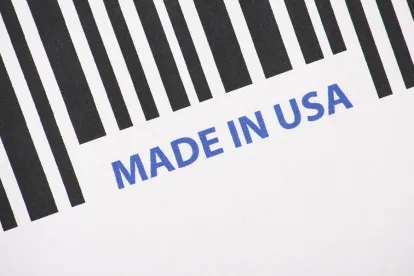California remains the hotbed for “Made in USA” litigation, but lawsuits like these are popping up across the United States.
Takeaways?
-
Retailers selling products in California should beware of potential retroactive application of California’s previous 100 percent U.S. content requirements, until the Ninth Circuit rules on whether the January 1, 2016, amendment to § 17533.7 constituted a legislative repeal of the previous version of the statute.
-
All retailers should beware of state and federal “Made in USA” requirements and restrictions against deceptive trade practices, and ensure that internal controls are implemented such that U.S.-origin claims— whether unqualified or qualified — are adequately substantiated.
Update on California
California’s amended “Made in USA” labeling requirements — which lowered the state’s domestic content thresholds from an untenable 100 percent threshold to, in most cases, a 95 percent domestic content requirement — have been in effect for well over a year now. Nevertheless, the new law has not stopped plaintiffs from arguing that the previous, more plaintiff friendly, requirements should govern for injuries alleged to have occurred prior to January 1, 2016.
A number of federal courts in California have determined that the amended version of Cal. Bus. & Prof. Code § 17533.7 applies retroactively—see Alaei v. Rockstar, Inc. et al., 3:15cv2959 (S.D. Cal.); Clark v. Citizens of Humanity, LLC et al., 3:14cv1404 (S.D. Cal.); Fitzpatrick v. Tyson Foods, Inc., 2:16cv58 (E.D. Cal.); Fitzpatrick v. Big Heart Pet Brands et al., 2:16cv63 (E.D. Cal); Natalie Rossetti v. Stearn S Products, Inc., 2:16cv1875 (C.D. Cal.)—but that issue has been appealed to the U.S. Court of Appeals for the Ninth Circuit. Fitzpatrick v. Tyson Foods, Inc., No. 16-17038 (9th Cir.); Fitzpatrick v. Big Heart Pet Brands, No. 17-15047 (9th Cir.).
Both Fitzpatrick v. Tyson Foods, Inc. and Fitzpatrick v. Big Heart Pet Brands have been consolidated before the Ninth Circuit, which has directed the parties to brief the issue of whether the January 1, 2016, amendment to § 17533.7 constituted a legislative repeal of the previous version of that subsection. Although it is likely that the Ninth Circuit will find that the pre-2016 version of §17533.7 is no longer applicable, there will be no definitive answer for at least a few more months. The briefing schedule for the parties runs through May 2017.
Plaintiffs in California have also begun filing suits under the state’s current version of § 17533.7. See, e.g., Dashnaw et al. v. New Balance Athletics, Inc. et al., 3:17cv159 (S.D. Cal.). Unlike the federal “Made in USA” guidelines enforced by the Federal Trade Commission (FTC), which applies an “all or virtually all” standard for any unqualified “Made in USA” claim, California prohibits a “Made in USA” label if a product, or any part thereof, “has been entirely or substantially made, manufactured, or produced outside of the United States.” The California statute further explains that this prohibition does not apply if either:
-
The part of the product produced outside of the United States constitutes less than five percent of the “final wholesale value of the manufactured product,” or
-
If the manufacturer can demonstrate that “it can neither produce the article, unit, or part within the United States nor obtain the article, unit, or part of the merchandise from a domestic source,” and that “all of the articles, units, or parts of the merchandise obtained from outside the United States constitute not more than 10 percent of the final wholesale value of the manufactured product.”
The previous version of §17533.7 prohibited a “Made in USA” label if any portion of the underlying product was made outside of the United States, without exceptions.
Litigation Outside of California
Cases challenging the labeling of products with unqualified “Made in USA” claims are not happening just in California.
In April 2017, Judge Ellis, of the Northern District of Illinois, denied Nature’s Way Products, LLC’s (Nature’s Way) motion to dismiss plaintiff’s claim that Nature’s Way’s product “Alive! Women’s Energy Supplements” contains substantial ingredients that are not “Made in the USA” as advertised, in violation of the Illinois Consumer Fraud and Deceptive Business Practices Act. McDonnell v. Nature's Way Products LLC et al., No. 1:16cv5011 (N.D. Ill.). In that case, the plaintiff alleges that she purchased the vitamin supplements on “several occasions in 2013 and 2014 at CVS and Walgreens stores” and that she “relied on the representation that Women’s Alive was made in the USA when buying the supplement because she prefers to purchase goods made in the United States instead of imported goods and she believed that the vitamins contained in the supplement did not originate from foreign sources.”
There is also an active “Made in USA” lawsuit ongoing in the Middle District of Florida. In Sweat v. NBTY, INC., No. 3:16cv940 (M.D. Fla.), the plaintiff, on behalf of herself and all others similarly situated, filed an amended complaint against NBTY, Inc., a vitamin manufacturer, alleging that NBTY’s “Ester-C 500mg Tablets,” in addition to other products manufactured by NBTY, contained an American flag on the back label and the words “Made in USA,” despite the fact that the tablets and other NBTY products contain “foreign-sourced ingredients,” in violation of Florida’s Deceptive and Unfair Trade Practices Act, and the laws of eight other states. Although the case was referred to mediation on January 20, 2017, the parties are currently engaged in discovery.
Federal Trade Commission Enforcement
Outside of private party litigation and an active plaintiffs’ class-action bar, the FTC has increased its review and enforcement of unqualified “Made in USA” claims, both on product labels, as well as internet and print advertising. For example, on March 1, 2017, the FTC published a closing letter it sent to Target Corporation disclosing the voluntary corrective actions and enhanced internal controls that Target agreed to implement, avoiding the FTC’s filing an administrative complaint challenging the claims as deceptive under Section 5 of the FTC Act. The FTC also filed an action along with a settlement on March 8, 2017, against Block Division, Inc., in which the Texas-based distributor of pulley block systems agreed to cease making misleading unqualified “Made in USA” claims on its website, in print advertising, and in social media. Subsequent violations by Block Division of the FTC’s consent order may result in civil penalties of up to $40,654 per violation.
Recommendations
It is unlikely that these types of cases challenging unqualified “Made in the USA” claims on labels or in marketing will cease any time soon—especially considering the focus of the new administration on increasing the production of goods within the United States.
Accordingly, we recommend:
For retailers selling products in California:
-
Until the Ninth Circuit rules definitively to the contrary, understand that the pre-2016 version of Cal. Bus. & Prof. Code § 17533.7 may still be a basis for a plaintiff to bring suit.
-
Although §17533.7 does not expressly define “final wholesale value,” the California Senate expressly stated that the “most comparable state statute” is the “Made in California Program,” which defines “wholesale value” as including “the direct material cost, direct labor cost, and overhead (indirect material and indirect labor costs).”
For retailers selling products throughout the United States:
-
Be aware that each state has its own separate standards apart from and sometimes in contrast to the FTC’s federal guidelines. Each new market should be scrutinized before entering to ensure that any proposed “Made in USA” label can be used and supported.
-
Be aware that the FTC requires that products labeled or marketed with an unqualified “Made in USA” claim must be “all or virtually all” made in the United States. In other words, the product should contain “no—or negligible—foreign content.”
-
If supported and truthful, qualified “Made in USA” claims — such as “Made in USA with Imported Materials” or “Assembled in the USA with Globally-Sourced Materials” — will likely pass FTC scrutiny, provided a foreign country of origin marking is not required under United States Customs and Border Protection’s laws and regulations.
-
Ensure written certifications and documented support are obtained from all suppliers to confirm the U.S. content and processing steps of domestic raw materials and finished products to support any unqualified “Made in USA” claim. Internal controls should be implemented to track shifting sourcing patterns that may necessitate a change in any domestic origin claims, and updated recordkeeping practices and training of marketing personnel are recommended to avoid unsupported or inconsistent domestic origin claims on product labels or marketing materials.







 />i
/>i

